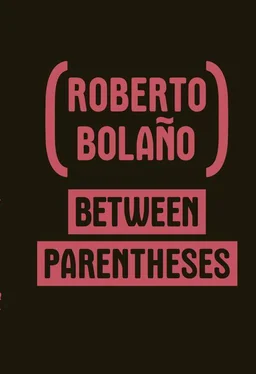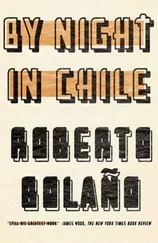Roberto Bolaño - Between Parentheses - Essays, Articles and Speeches, 1998-2003
Здесь есть возможность читать онлайн «Roberto Bolaño - Between Parentheses - Essays, Articles and Speeches, 1998-2003» весь текст электронной книги совершенно бесплатно (целиком полную версию без сокращений). В некоторых случаях можно слушать аудио, скачать через торрент в формате fb2 и присутствует краткое содержание. Год выпуска: 2011, Издательство: New Directions, Жанр: Публицистика, Критика, на английском языке. Описание произведения, (предисловие) а так же отзывы посетителей доступны на портале библиотеки ЛибКат.
- Название:Between Parentheses: Essays, Articles and Speeches, 1998-2003
- Автор:
- Издательство:New Directions
- Жанр:
- Год:2011
- ISBN:нет данных
- Рейтинг книги:4 / 5. Голосов: 1
-
Избранное:Добавить в избранное
- Отзывы:
-
Ваша оценка:
- 80
- 1
- 2
- 3
- 4
- 5
Between Parentheses: Essays, Articles and Speeches, 1998-2003: краткое содержание, описание и аннотация
Предлагаем к чтению аннотацию, описание, краткое содержание или предисловие (зависит от того, что написал сам автор книги «Between Parentheses: Essays, Articles and Speeches, 1998-2003»). Если вы не нашли необходимую информацию о книге — напишите в комментариях, мы постараемся отыскать её.
The Savage Detectives
Between Parenthese
Between Parentheses: Essays, Articles and Speeches, 1998-2003 — читать онлайн бесплатно полную книгу (весь текст) целиком
Ниже представлен текст книги, разбитый по страницам. Система сохранения места последней прочитанной страницы, позволяет с удобством читать онлайн бесплатно книгу «Between Parentheses: Essays, Articles and Speeches, 1998-2003», без необходимости каждый раз заново искать на чём Вы остановились. Поставьте закладку, и сможете в любой момент перейти на страницу, на которой закончили чтение.
Интервал:
Закладка:
Far from Greece, and in a different age, another poet, Snorri Sturluson (1179–1241), who loved the valiant, also came face to face in a single night with fear and the true picture of valor: a field of bones that we all must cross. Courage takes many forms. Sometimes it’s a ghost that hovers over our heads. Sometimes it’s a gleam to which we’re irrationally faithful. For my generation the picture of courage is Billy the Kid, who gambled his life for money, and Che Guevara, who gambled it for generosity; Rimbaud, who walked alone at night, and Violeta Parra, who opened windows in the night. Courage is useless, we were told happily, carelessly, by the poet and Spanish soldier Alonso de Ercilla, the most generous of brave men and perhaps one of the most swiftly forgotten, but we can’t live without it.
WILCOCK
Many years ago, when I lived in Gerona and was poor, or at least poorer than I am now, a friend loaned me the book The Temple of Iconoclasts , by J. Rodolfo Wilcock, published by Anagrama, Number 7 in the Panorama de Narrativas collection, which was just getting underway.
In those days I didn’t have the money to buy books and everything I read was borrowed from the library (it was there that I discovered Tomeo, there that I read Liddell Hart and all the books I could find on the Napoleonic wars), although every once in a while some friend (always the same one, now that I think about it) would loan me a new novel, something that had just come out. This friend’s name was Carles and he was a sportswriter, but he was sent books from Anagrama, why I don’t remember, since of course he never reviewed a single one. Nor can I say that Carles was a fan of literature, which he in fact viewed with some distrust and perplexity, being on much surer ground, this friend of mine, in matters of local sports and even the crime beat, which he sometimes worked. But he was a good person, and when I went to see him I always left with a book, which fifteen days later I religiously returned.
Thus it was that The Temple of Iconoclasts came into my hands, during a cold, wet winter, and I still remember the enormous pleasure it brought me, and the consolation, too, at a time when almost everything was full of sadness. Wilcock’s book restored happiness to me, as is only the case with those masterpieces of literature that are also masterpieces of black humor, like Lichtenberg’s Aphorisms or Sterne’s Tristram Shandy . Of course, Wilcock’s book tiptoed out of bookstores. Today, seventeen years later, it has just been reprinted. If you want to have a good time, if you want to cure what ails you, buy it, steal it, borrow it, but most importantly, read it.
PUIGDEVALL THE STRANGE
Among my friends, the strangest is Ponç Puigdevall. Sometimes I see him walking the winding streets of Gerona, completely oblivious of everything around him, and then I know he’s mulling over the framework of a story, the secret mechanisms of structure, that jungle full of predatory beasts from which most writers flee and through which he strolls like Stewart Granger through the ruins of King Solomon’s mines or like Edgar Allan Poe through the icy landscapes of Antarctica, or in other words in the calmest and most inscrutable fashion, and it’s only because of this that Ponç sometimes fails to recognize or greet anyone while he’s wandering the streets of Gerona, or if he does greet you it’s in a mechanical way, as if he were seeing you in a dream or after many sleepless nights.
Cult writer, difficult writer, strange writer: Ponç’s work is hard to classify. Sometimes I see him walking with his dog, who’s called Book, and besides not being able to tell who’s walking whom, I get the sense that both of them, the dog-book and the man-reader, are heading straight for the abyss or toward a similar accident with an indifference and elegance that I haven’t encountered in any other Catalan writer or any other dog. This must be a consequence of the esteem I feel for Ponç, which, by the way, doesn’t extend to the dog, who once growled at me in my own house and who, as his name suggests, is a somewhat overwrought animal. And yet I haven’t known Ponç for long: three years, if that. Then why do I feel so close to him? It may be his fragility and his radicalism. Because Ponç, who writes like one possessed, hasn’t received grants or assistance or anything: his books are the product of a vast storm-tossed library and of his intelligence and scrupulousness, not of a comfortable situation or prior agreements made with anyone. His devotion to literature might frighten some. Do I need to say that in my opinion he’s one of the three or four best living Catalan writers, and that I feel honored to be his friend?
JAVIER CERCAS COMES HOME
I met Javier Cercas when he was seventeen. I was living in Gerona at the time, and he lived in Gerona too, and he was a kid who wanted to be a writer. He was a friend of Xavi Coromines, who introduced him to me. I don’t know what happened to Coromines, whom I liked, but I do know, at least by hearsay, what happened to Cercas. After he graduated from college he spent a long time teaching in the United States, in the Midwest. He wrote a short novel, El inquilino [The Tenant], and a long one, El vientre de la ballena [The Belly of the Whale] — the first published by Sirmio and the second by Tusquets — that got the attention of readers and especially of writers because of the glimpse the novels gave of an uncommonly talented writer; he also wrote a story collection and a collection of literary essays in which he expresses his irrational enthusiasm for John Irving, an enthusiasm that I don’t share. One day he decided to return to Catalonia and he got a job teaching at the University of Gerona. But although he worked in Gerona, Cercas lived in Barcelona and made his life in Barcelona. When I saw him again he was married and had a son, Raulito, a fan of the Teletubbies. His life in those days was extreme, mostly because Cercas is essentially extreme, capable of uniting in himself the understated and the outlandish, rationalism and eccentricity. Now, at last, Cercas is back in Gerona. He’s here to take it easy. Or at least that’s the official explanation. Or so his wife and son can have a yard. Or to be closer to his job, so he isn’t killed in a car accident. The truth is, I doubt all of these explanations. Cercas has come home to write the big books that are up there in his head. He’s back home to become one of the best writers in the Spanish language. Only great challenges make it worthwhile to pack up and move all one’s books.
NERUDA
I’ve just read, or reread, or randomly flipped through, the way you might skim your grandfather’s business correspondence and love letters, the first volume of Pablo Neruda’s Obras completas [Complete Works], (from Crepusculario to Las uvas y el viento [The Grapes and the Wind], 1923–1954), published by Galaxia Gutenberg — Círculo de Lectores in an excellent edition compiled by Hernán Loyola, a Chilean and top Neruda scholar, with the assistance of the Argentine poet Saúl Yurkievich.
The book, more than twelve hundred pages long, contains the main body of Neruda’s work and includes the three volumes that, for different reasons, brought the poet worldwide fame: Twenty Love Poems and a Song of Despair (1923–1924), Residence on Earth (1925–1935), probably the greatest Neruda, and Canto general (1938–1949), an endless, repetitive Neruda, the place where Whitman’s influence takes a crucial turn in Latin American poetry, a book in which extraordinary poems sit side by side with others that are clearly unsalvageable.
Читать дальшеИнтервал:
Закладка:
Похожие книги на «Between Parentheses: Essays, Articles and Speeches, 1998-2003»
Представляем Вашему вниманию похожие книги на «Between Parentheses: Essays, Articles and Speeches, 1998-2003» списком для выбора. Мы отобрали схожую по названию и смыслу литературу в надежде предоставить читателям больше вариантов отыскать новые, интересные, ещё непрочитанные произведения.
Обсуждение, отзывы о книге «Between Parentheses: Essays, Articles and Speeches, 1998-2003» и просто собственные мнения читателей. Оставьте ваши комментарии, напишите, что Вы думаете о произведении, его смысле или главных героях. Укажите что конкретно понравилось, а что нет, и почему Вы так считаете.












